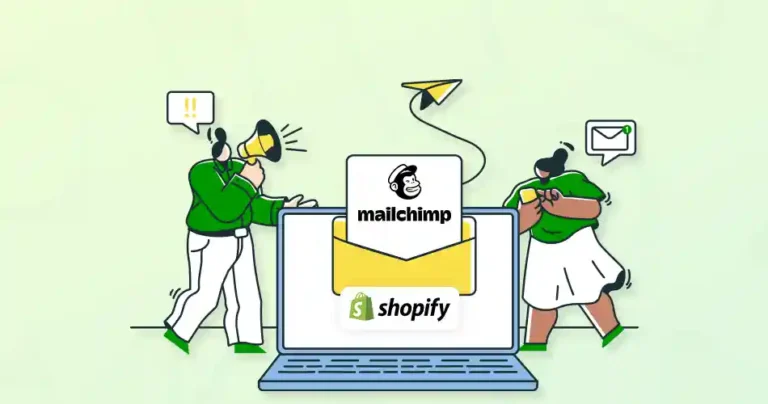For any eCommerce business, having a solid marketing strategy is essential. A big part of that strategy is eCommerce email marketing, and this is where Shopify Experts Developers can make a difference. One of the most popular tools for this is Mailchimp.
Connecting Mailchimp to Shopify automates data syncing. It lets you run targeted email campaigns based on customer behavior. You can also track performance easily. This not only boosts sales but also strengthens customer relationships.
In this blog, we’ll show you how Shopify Experts Developers connect Mailchimp with Shopify stores. This integration can boost your marketing efforts and help increase sales. Let’s start with the key benefits of this integration!
Why Integrate Mailchimp with Shopify?
Connecting Mailchimp with Shopify creates a strong partnership for online stores. It simplifies marketing tasks and helps increase sales. Here are the key benefits:
- Automated Email Marketing: Send emails automatically when customers buy or leave items in their carts. This saves time and boosts conversions.
- Targeted Campaigns: Group customers by their buying habits and demographics. This helps create messages that are more relevant and effective.
- Enhanced Customer Engagement: Deliver personalized product recommendations and offers, fostering stronger customer relationships.
- Easier Data Management: Connect customer data smoothly across platforms. This cuts out manual entry and removes data silos.
- Abandoned Cart Recovery: Automatically remind customers about items they left behind. This can help recover sales that might be lost.
- Post-purchase Follow-ups: Send automated thank-you emails and product recommendations, encouraging repeat purchases.
- Streamlined Workflow: Handle email marketing and eCommerce tasks from one place. This boosts efficiency.
Mailchimp is one of the key eCommerce marketing tools. You can set up a simple system to manage customer relationships. This helps boost sales and grow your business.
How to Integrate Mailchimp with Shopify?
Connecting Shopify and Mailchimp helps you simplify your eCommerce and marketing tasks. So you can effectively manage customer data, run targeted campaigns, and boost sales.
There are a few ways to integrate Mailchimp and Shopify.
Option 1: Using the Mailchimp App
The Email & SMS – Mailchimp for Shopify app is on the Shopify App Store. It makes it easy to connect your Shopify store to your Mailchimp account. This app helps Shopify merchants use Mailchimp’s powerful marketing tools easily. No complex setups or technical skills are needed.
How to Integrate?
Step 1: Access the Shopify App Store: Navigate to the Shopify App Store and search for Email & SMS – Mailchimp for Shopify.
Step 2: Install the App: Select the app and click the Install button to integrate it on your Shopify store. Follow any on-screen instructions to complete the installation.
Step 3: Authorize the Connection: Log in to your Mailchimp account when prompted.
Step 4: Customize Sync Settings: Change the sync settings to choose what data is shared between the two platforms. Options include syncing customer details, order history, and product information.
Step 5: Start Marketing: Once the setup is complete, begin using Mailchimp’s features. You can create and send email campaigns, set up SMS marketing, and analyze campaign performance. Plus, your Shopify store data updates in real time.
Key Capabilities of Mailchimp Shopify App
The Mailchimp Shopify app offers several valuable tools to enhance your marketing efforts:
- Sync Your Data: Connect your Shopify customer info to Mailchimp automatically. This includes their purchase habits and order history. This helps you target customers more accurately.
- Advanced Campaign Tools: Create and run email and SMS campaigns for your audience right from Mailchimp.
- Performance Analytics: See how well your marketing campaigns work. Track conversions and improve your strategies using clear analytics.
- User-Friendly Interface: Easily manage your marketing with a simple dashboard. It makes creating and managing campaigns a breeze.
Connecting Shopify with Mailchimp creates a unified system. This helps blend your eCommerce and marketing strategies. That helps grow your business with less manual effort and more precision.
Option 2: Third-party Alternatives
The official app is a good choice, but here are some alternatives. They offer advanced features or fit specific needs better:
ShopSync
- Features: ShopSync is free and easy to set up. It syncs data smoothly between Shopify and Mailchimp.
- Best For: Businesses looking for a cost-effective and no-frills integration solution.
- Limitations: May lack advanced features like deep customization or extended analytics.
Zapier
- Features: A strong automation tool that links Shopify, Mailchimp, and more apps. Create custom workflows for data transfer and automation.
- Best For: Businesses with complex automation needs across multiple platforms.
- Limitations: Requires a paid plan for advanced features and larger-scale workflows.
Automate.io
- Features: Similar to Zapier, it allows for robust automation between Shopify and Mailchimp.
- Best For: eCommerce businesses seeking flexible and scalable automation options.
- Limitations: Has a steeper learning curve compared to other tools.
Integrately
- Features: Offers one-click integrations with pre-built workflows for connecting Shopify and Mailchimp.
- Best For: Beginners who want a quick and hassle-free setup.
- Limitations: Fewer customization options compared to Zapier or Automate.io.
These tools can help you connect Mailchimp with Shopify. Then, you can enjoy the benefits of this strong pairing.
To integrate these two tools well, reach out to our Shopify development company for help.
Key Features of Mailchimp for Shopify
Mailchimp provides a strong set of tools to boost eCommerce marketing when used with Shopify:
Email Campaigns
Mailchimp provides a strong set of tools for email campaigns. You can create newsletters, promotional emails, and targeted marketing messages easily.
Feature Highlights
- Drag-and-drop editor: Easily design visually appealing emails without coding knowledge.
- Pre-designed templates: Use professionally designed templates to quickly create effective campaigns.
- Segmentation and targeting: Send emails that match customer demographics, past purchases, and behavior.
- A/B testing: Test different email subject lines, content, and send times to optimize campaign performance.
- Reporting and analytics: Keep an eye on key metrics such as open rates, click-through rates, and conversions. This helps you see how effective your campaign is.
Automation
Mailchimp’s automation features let you send emails based on customer actions. For example, you can trigger emails for abandoned carts, new sign-ups, or purchases.
Feature Highlights
- Abandoned cart emails: They automatically remind customers about items they left behind. This helps recover lost sales.
- Welcome emails: Greet new subscribers and introduce them to your brand and products.
- Post-purchase emails: Send thank-you messages, product recommendations, and shipping updates.
- Product retargeting emails: Reach out to customers who looked at certain products but didn’t buy.
- Date-based automations: Send birthday emails or anniversary offers to foster customer loyalty.
Product Recommendations
Mailchimp can suggest products to your customers. It uses their past purchases, browsing history, and preferences to make these recommendations.
Feature Highlights
- Personalized recommendations: Increase engagement and sales by suggesting relevant products to each customer.
- Data-driven insights: Leverage customer data to understand their interests and provide tailored recommendations.
- Dynamic content blocks: Easily insert product recommendations into your email campaigns.
- Increase average order value: Feature related products to motivate customers to buy extra items.
Popups and Signup Forms
Mailchimp offers tools for pop-up forms and embedded signup forms. These help you collect email addresses from visitors to your website.
Feature Highlights
- Customizable designs: Match the look and feel of your website with customizable form templates.
- Targeting options: Display pop-ups based on specific triggers, such as exit intent or time spent on page.
- List growth: Build your email list and expand your marketing reach.
- Integration with Shopify: Seamlessly sync new subscribers with your Mailchimp audience.
- Multiple form types: Choose from various form types, including pop-ups, embedded forms, and slide-in forms.
Using Mailchimp with Shopify lets businesses handle email marketing and eCommerce in one place.
Best Practices for Mailchimp and Shopify Integration
To fully leverage the integration of Mailchimp with Shopify, applying best practices is essential. These strategies will optimize your marketing, increase engagement, and drive conversions:
- Segment Your Audience: Use Shopify’s customer data to make targeted audience groups in Mailchimp. Categories like purchase frequency, product preferences, or geographic location enable more personalized marketing.
- Test and Optimize Campaigns: Run A/B tests on email elements such as subject lines, content, and call-to-action (CTA) buttons. Use the results to refine your messaging and maximize impact.
- Track Key Metrics: Keep an eye on open rates, click-through rates, and conversion rates. This helps you see how well the campaign is doing. Leverage these insights to continuously improve your marketing strategy.
- Keep Your Email List Healthy: Update your subscriber list often. Remove inactive or invalid email addresses. This practice enhances deliverability and ensures higher engagement rates.
Using these best practices can improve your marketing and boost results with Mailchimp and Shopify. Get our Shopify development services to ensure the best results effectively..
Let’s Conclude
Integrating Mailchimp with Shopify can help streamline the eCommerce marketing efforts and boost sales. By installing the Mailchimp app and authorizing the connection, businesses gain access to a suite of features designed to enhance customer engagement and drive revenue.
Automated email marketing, including abandoned cart recovery and post-purchase follow-ups, saves valuable time and increases conversions. And targeted campaigns, leveraging customer segmentation based on purchase history and demographics, ensure highly relevant messaging.
If you need help with the integration and successful implementation, let’s connect today!
FAQs
Q1. What is Mailchimp, and how does it work with Shopify?
Mailchimp is an email marketing platform that allows businesses to create, manage, and analyze email campaigns. By integrating it with Shopify, you can sync customer and order data, enabling personalized email marketing, automated campaigns, and performance tracking directly linked to your eCommerce store.
Q2. What are the benefits of using the official Mailchimp integration?
The integration ensures real-time data synchronization, targeted email and SMS campaigns, easy setup, and robust analytics. It’s ideal for businesses looking for a streamlined solution to manage their marketing efforts from a single platform.
Q3. How much does the official Mailchimp app for Shopify cost?
The Mailchimp app itself is free to install from the Shopify App Store. However, depending on your Mailchimp plan and usage, additional charges for email sends, advanced features, or SMS marketing may apply.
Q4. Is Mailchimp GDPR-compliant when integrated with Shopify?
Yes, Mailchimp complies with GDPR standards. However, it’s important to ensure that your email marketing practices, including obtaining consent from customers and providing an easy opt-out option, align with GDPR regulations.





